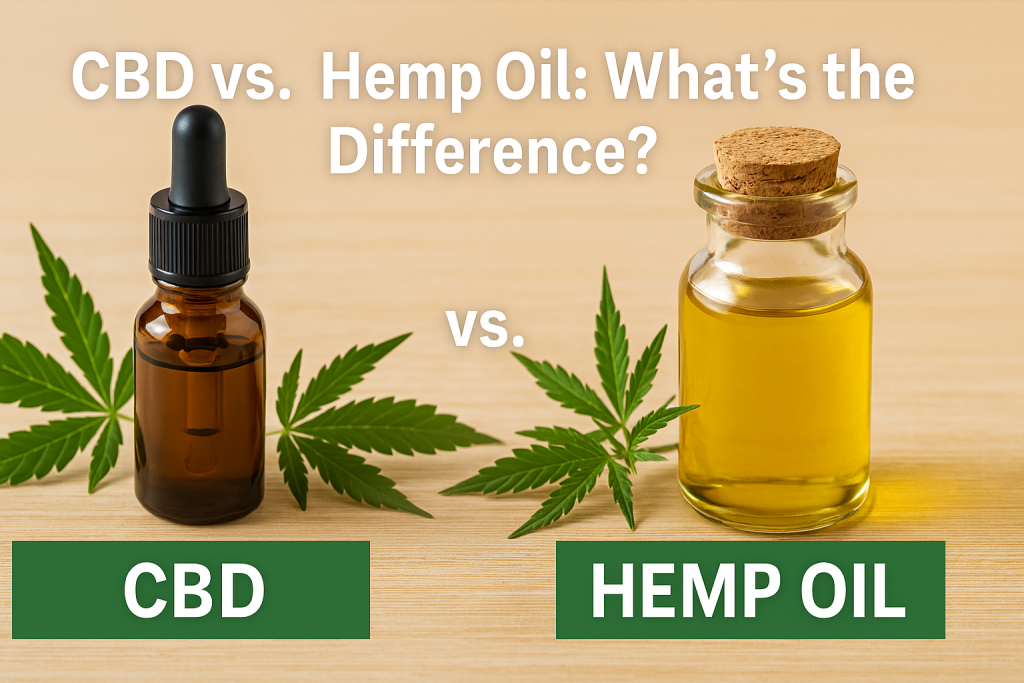CBD
CBD vs. Hemp Oil: What’s the Difference?
In recent years, both CBD oil and hemp oil have grown in popularity, especially in the health and wellness industries. These two oils are often confused with one another, leading many consumers to mistakenly believe they’re the same. However, despite being derived from the same plant species — Cannabis sativa — CBD oil and hemp oil are fundamentally different in composition, usage, and benefits.
This article explores the key differences between CBD oil and hemp oil to help you make informed decisions when choosing products.
1. What is CBD Oil?
CBD, short for cannabidiol, is a naturally occurring compound found in the flowers, leaves, and stalks of the cannabis plant. CBD oil is extracted specifically for its high concentration of cannabidiol and is often used for its therapeutic benefits.
How CBD Oil is Made:
CBD oil is typically extracted using CO2 or ethanol methods from the flowers and leaves of hemp plants, which are bred to be high in CBD and low in THC (tetrahydrocannabinol – the psychoactive compound in cannabis).
Common Uses of CBD Oil:
- Pain and inflammation relief
- Anxiety and stress reduction
- Improved sleep quality
- Support for neurological disorders (e.g., epilepsy)
CBD oil can be found in various forms like tinctures, capsules, gummies, topicals, and vapes.
2. What is Hemp Oil?
Hemp oil, also known as hemp seed oil, is extracted from the seeds of the hemp plant. Unlike CBD oil, hemp oil does not contain any cannabinoids, including CBD or THC. However, it is rich in nutrients, especially omega-3 and omega-6 fatty acids, vitamins, and antioxidants.
How Hemp Oil is Made:
Hemp oil is made through a cold-pressing process similar to how olive oil is made. The seeds are pressed to release their oil, which is then filtered for purity.
Common Uses of Hemp Oil:
- Cooking and salad dressings
- Skincare products (moisturizers, soaps, shampoos)
- Nutritional supplements (supports heart and brain health)
Since it contains no cannabinoids, hemp oil does not produce any therapeutic effects associated with CBD.
3. Key Differences Between CBD Oil and Hemp Oil
| Aspect | CBD Oil | Hemp Oil |
| Source | Flowers, leaves, and stalks of hemp | Seeds of the hemp plant |
| Cannabinoid Content | High in CBD, may contain trace THC (0.3% or less) | No CBD or THC |
| Uses | Pain relief, anxiety, sleep, inflammation | Nutrition, skincare, haircare |
| Method of Extraction | CO2 or ethanol extraction | Cold-pressed |
| Legal Status | Legal in many countries (must meet THC limits) | Fully legal as a food or skincare ingredient |
4. Why the Confusion?
The confusion between CBD oil and hemp oil is largely due to misleading marketing. Some manufacturers label hemp seed oil as “hemp oil” in an attempt to ride the CBD trend. This misleads consumers into thinking they are buying CBD-rich products when they are not.
When purchasing any hemp-related product, it’s important to:
- Read the label carefully
- Look for terms like “CBD,” “cannabidiol,” or “full-spectrum hemp extract”
- Check for third-party lab testing to verify CBD content
5. Which One Should You Choose?
- Choose CBD oil if you’re seeking relief from stress, anxiety, chronic pain, or sleep disorders.
- Choose hemp oil if you’re looking for a nutritious supplement or a natural skincare solution.
They serve different purposes, and your choice should depend on your specific needs.

